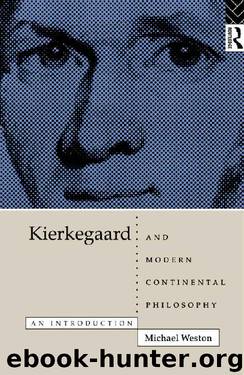Kierkegaard and Modern Continental Philosophy by Michael Weston

Author:Michael Weston [Weston, Michael]
Language: eng
Format: epub
ISBN: 9781134854271
Publisher: Taylor and Francis
Published: 2003-05-20T07:00:00+00:00
I
‘The guiding question of Western philosophy is “what is being?”…what is meant is the whole, being taken as a whole from the outset, being taken as such unity’.16 Metaphysics asks after the Being of beings. That is, it addresses what is, and asks after its nature: in Wittgenstein’s phrase, ‘all being’. The metaphysical question asks, therefore, about the possibility of truth: what is it about what is that enables there to be truth? The posing of this question required, as we will see, the unconcealing of ‘the being as such’, of the realm of ‘all being’, the correlate of the proposition which can be true or false. Greek metaphysics responds to this revelation of ‘the being as such’ by thinking its nature as what manifests itself of itself to us, as what can be apprehended by our intellect. What is can only be understood as being in so far as it manifests itself as participating in intelligibility and so exhibits a principle in terms of which the intelligible and that which participates in it can be understood. Such a principle is the idea of the Good or Aristotle’s God, thought thinking itself, which shows itself to our intellect. In terms of this we can then understand things within the world as they participate in the purely intelligible and which thereby reveals them in their truth. Man is as a being not merely in having an essence, but in apprehending the truth of all else: in knowing the truth he participates in the divine, the principle of harmony between the intelligible and what is in time. The Being of what is, its nature as being, which makes possible our thinking truly or falsely about it, lies in its intelligibility, which itself involves the principle of the unity of the intelligible and what is in time and which, manifesting itself within our own intelligence, makes possible our possession of logos. The wonder of Greek metaphysics is directed towards this: that reality is intelligible. This wonder is, as wonder, directed towards the principle of intelligibility which man both participates in and can apprehend through his own intellectual power.
That there should be the truth of truth available to our intelligence in terms of which what is can be thought of as being does not address Greek metaphysics as a question. The Greeks respond, rather, to an intelligibility which gives itself and to which we should subordinate our intellect. For that question to address man, this self-giving must give way so that man is thrown into an uncertainty as to how he can know that what shows itself to his intelligence is the truth of what is, so that he can be sure of his own truth. The Medieval Christian interpretation responds to this question by an understanding of what is, not as showing the principle of its truth to us of itself, but as created in order to lead man to its creator. The ‘certitude of the salvation of the individual is the standard for all truth’.
Download
This site does not store any files on its server. We only index and link to content provided by other sites. Please contact the content providers to delete copyright contents if any and email us, we'll remove relevant links or contents immediately.
The remains of the day by Kazuo Ishiguro(8964)
Tools of Titans by Timothy Ferriss(8359)
Giovanni's Room by James Baldwin(7315)
The Black Swan by Nassim Nicholas Taleb(7097)
Inner Engineering: A Yogi's Guide to Joy by Sadhguru(6783)
The Way of Zen by Alan W. Watts(6590)
Asking the Right Questions: A Guide to Critical Thinking by M. Neil Browne & Stuart M. Keeley(5751)
The Power of Now: A Guide to Spiritual Enlightenment by Eckhart Tolle(5741)
The Six Wives Of Henry VIII (WOMEN IN HISTORY) by Fraser Antonia(5493)
Astrophysics for People in a Hurry by Neil DeGrasse Tyson(5172)
Housekeeping by Marilynne Robinson(4433)
12 Rules for Life by Jordan B. Peterson(4298)
Double Down (Diary of a Wimpy Kid Book 11) by Jeff Kinney(4257)
The Ethical Slut by Janet W. Hardy(4236)
Skin in the Game by Nassim Nicholas Taleb(4232)
Ikigai by Héctor García & Francesc Miralles(4229)
The Art of Happiness by The Dalai Lama(4118)
Skin in the Game: Hidden Asymmetries in Daily Life by Nassim Nicholas Taleb(3986)
Walking by Henry David Thoreau(3949)
